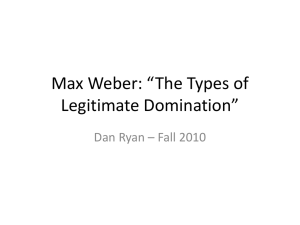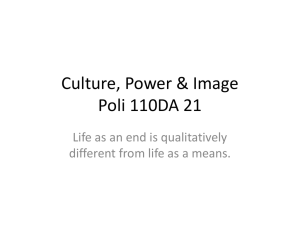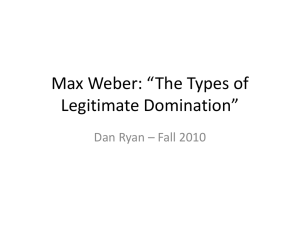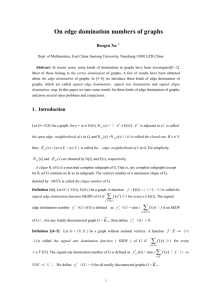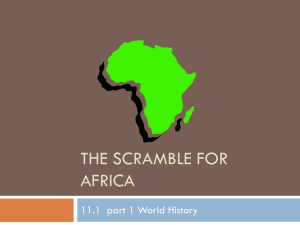Anarchism and Non-domination
advertisement
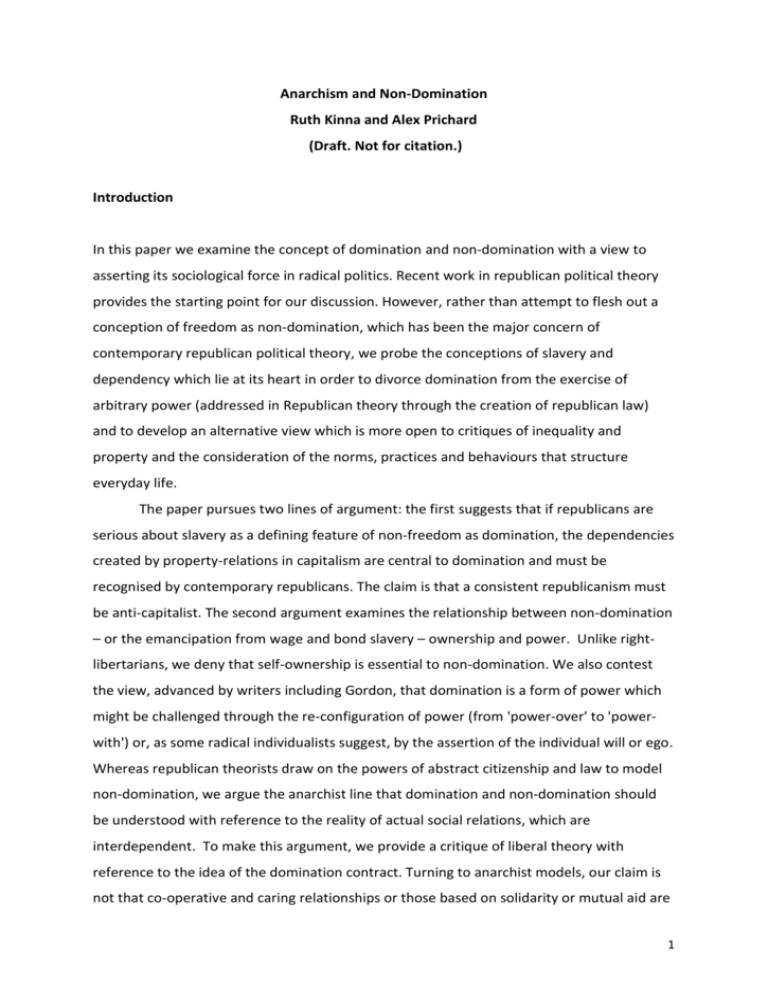
Anarchism and Non-Domination Ruth Kinna and Alex Prichard (Draft. Not for citation.) Introduction In this paper we examine the concept of domination and non-domination with a view to asserting its sociological force in radical politics. Recent work in republican political theory provides the starting point for our discussion. However, rather than attempt to flesh out a conception of freedom as non-domination, which has been the major concern of contemporary republican political theory, we probe the conceptions of slavery and dependency which lie at its heart in order to divorce domination from the exercise of arbitrary power (addressed in Republican theory through the creation of republican law) and to develop an alternative view which is more open to critiques of inequality and property and the consideration of the norms, practices and behaviours that structure everyday life. The paper pursues two lines of argument: the first suggests that if republicans are serious about slavery as a defining feature of non-freedom as domination, the dependencies created by property-relations in capitalism are central to domination and must be recognised by contemporary republicans. The claim is that a consistent republicanism must be anti-capitalist. The second argument examines the relationship between non-domination – or the emancipation from wage and bond slavery – ownership and power. Unlike rightlibertarians, we deny that self-ownership is essential to non-domination. We also contest the view, advanced by writers including Gordon, that domination is a form of power which might be challenged through the re-configuration of power (from 'power-over' to 'powerwith') or, as some radical individualists suggest, by the assertion of the individual will or ego. Whereas republican theorists draw on the powers of abstract citizenship and law to model non-domination, we argue the anarchist line that domination and non-domination should be understood with reference to the reality of actual social relations, which are interdependent. To make this argument, we provide a critique of liberal theory with reference to the idea of the domination contract. Turning to anarchist models, our claim is not that co-operative and caring relationships or those based on solidarity or mutual aid are 1 non-dominating. Rather our interest is to consider what kind of sociological arrangements and practices might best support relationships of mutual aid whilst recognising the potential for domination. To this end we ask, which anarchist institutional forms are best suited to constituting non-domination? Our intervention can be understood as both a critique and development of both republican and anarchist political theory. Republican Political Theory: freedom as non-domination In recent debates with negative libertarians, advocates of republican political theory have developed a conception of liberty as non-domination. Distinguished from the taxonomy of positive and negative liberty outlined by Isaiah Berlin, liberty as non-domination is associated with independence: 'to be possessed of a power to act according to your own will rather than being obliged to live in dependence on the will or someone else' (Skinner: 2008, 86). It differs from positive freedom because, as Marylin Friedman argues, it does not demand self-mastery, only the absence of mastery by others (Friedman: 2008, 247) and it cannot be subsumed within the negative conception because it suggests that unfreedom results from the existence of arbitrary power, rather than from actual interference in action. For neo-Roman republicans, the paradigm of this kind of unfreedom is slavery. As Philip Pettit argues, '[d]omination ... is exemplified by the relationship of master to slave or master to servant' (Pettit: 1999, 22). Quentin Skinner develops the point: The nerve of republican theory can thus be expressed by saying that it disconnects the presence of unfreedom from the imposition of interference. The lack of freedom suffered by slaves in not basically due to their being constrained or interfered with in the exercise of any of their specific choices. Slaves whose choices happen never to fall out of conformity with the will or their masters may be able to act without the least interference. They may therefore appear, paradoxically, to be in full possession of their freedom, since none of their actions will ever be prevented or penalized. Such slaves nevertheless remain wholly bereft of liberty. They remain subject to the will of their masters, unable to act according to their own independent will at any time. They are, in other words, not agents at all. (Skinner: 2008, 89-90). 2 Starting from this understanding of slavery and domination, republicans argue that it is through law that one becomes free and without it, freedom is impossible since one would be at the arbitrary will of the more powerful. Contrary to libertarian and Hobbesian challenges to the republican tradition as outlined by Pettit, law is not an infringement on your liberty if it is responsive to individual interests, if it ‘tracks’ them and individuals are able to exercise a degree of control over their formulation. Where it does, law is not dominating, though it may be interfering (Pettit ***). Public vigilance and active citizenship provide the important checks on the potential for arbitrary rule-making, and likewise, a contestatory conception of democracy is also vital. According to the republican theory, non-domination – the move from slavery to freedom, from dominium to libertas, from the status of servus to liber – is constitutionalised through the enactment of political and legal equality. Pettit argues, 'we find constitutionalism in place wherever there are legally established ways of constraining the will of the powerful, even if the constraints are not recorded in a formal constitution.' (Pettit, 173, emphasis added) The freedoms constituted are negative, in the sense that they do not stipulate in advance the criteria that would have to be met for non-domination to be realised, nor is non-domination scalable against an abstract ideal. The political philosophy of non-domination provides a framework through which contested visions of the good can be equilibrated and none dominates any other. In this respect, republicanism can be thought of, in Chung’s phrase, as “axiologically neutral” (Chung ***). Furthermore, Chung argues that the negative character of neo-Roman republicanism represents a vision of politics that requires no intrinsic characteristics for its realisation (national identity, single language/ethnic group, deontological commitment to equality, etc). Nor can the extent and intensity of the state be predetermined (Pettit ***). The size of the state is not fixed and is potentially limitless depending on local socio-political specificties and the possibility of organising appropriate democratic and legal oversight. Chung, for example, in articulating a cosmopolitan vision for republicanism, believes that “differentiated sovereignty” and subsidiarity are both compatible with 'constitutional patriotism', another marker of republican politics central to overcoming the ethno-centrism of nineteenth-century republicanism. The boundaries of the state can fixed arbitrarily, because the development of international organisations , concomitant international human rights norms and systems 3 of legal redress overlap to create a sense of belonging to a shared community of fate brought on by the twin pressures of potential environmental destruction and nuclear Armageddon. Neo-republicans break with the classical, pre-nineteenth century tradition by opening up the polity to minorities, the propertyless and women. As Pettit argues, the republicans who identified with the tradition that extended from ancient Rome and which reappeared in Renaissance Italy and in England during the period of the Civil War, were 'like everyone else at the time, extremely narrow in their view of who counted in politics. They restricted the body of the citizens to mainstream, propertied males' and focused narrowly on freeing elite white men from the domination of would-be tyrants (Pettit: 2001, 145). The contemporary re-casting of republicanism, he contends, is compatible with and attractive to a range of different political visions. '[E]nvironmentalism, feminism, socialism, and multiculturalism can be cast as republican causes' (Pettit: 1999, 134). Yet some feminists and socialists have identified significant barriers to this recasting. Marilyn Friedman's sympathetic feminist analysis of Pettit's work both acknowledges his concern to break with historical republicanism but crucially, Friedman argues, Pettit's account of arbitrary interference (domination) takes 'account of the social' (Friedman: 2008, 250). 'Nondomination is not something to be achieved in isolation; it means the "absence of domination in the presence of other people"'. Moreover, although individuals are always the subject of domination, group memberships and shared identities affect the incidence of domination. Individuals might be subject to domination by virtue of '"markers" such as gender, race, or class'. (Friedman: 2008, 250). And in addition these markers, she argues, heterosexual norms and patriarchy might also be considered as regimes of domination, relevant to individual subjection. That said, Friedman identifies a number of flaws in Pettit's conception. One stems from his willingness to control the mere capacity for arbitrary interference rather than its actual exercise. This, she argues, suggests a degree of state intervention in ordinary life that is far more intrusive than the dominating behaviours the republic is designed to combat. While neo-Roman republicanism may not be concerned with the intensity and extent of the state, the propensity for its extension and intensification is a real historical worry, while the internationalisation of the state and the distance between the citizen and the elite is such that republicanism must take fuller account of global democratic deficits (Laborde 2011, 4 Kurki 2012). A second concern is that Pettit's conception of non-domination is rooted in a principle of independence which overlooks the 'essential role of dependency relationships in human life' and the positive value of care in relationships of dependency within families and elsewhere (Friedman: 2008, 255). This objection opens the way to an important discussion about the ways in which the concept of domination might be tweaked to recognise the significance of dependency relationships and the potential for beneficial, non-arbitrary care within them; the possibility that domination might occur even when the interests of weaker parties are met; the priority that attaches to the ideas that dependents have about their status within these relationships; and the complex and diverse identities that proliferate within dependent groups. John P. McCormick's discussion of Machiavelli probes the susceptibility of republican conceptions of freedom to oligarchy, elitism and class power (McCormick: 2003, 615-43). Republican theorists, he argues, have highlighted some of the significant shortcomings of contemporary liberal democracy 'for example, the expression of a non-xenophobic patriotism, attention to the common good, emphasis on duties as opposed to rights, and the importance of more substantive political participation'. Yet unless republican theory is 'reconstructed almost beyond the point of recognition' it serves only to 'reinforce what is worst about contemporary liberal democracy: the free hand that socioeconomic and political elites enjoy at the expense of the general populace' (McCormick: 2003, 616-7). As modern states increasingly internationalise their functions, and global elite networks increasingly supplant traditional state-forms of accountability, this problem is of paramount importance to huge swathes of the global justice movement (Maeckelbergh 2009). One of the problems McCormick identifies in Quentin Skinner's account of republican theory is the focus on political domination, captured abstractly in the critique of arbitrary power, where arbitrariness is defined as the unfreedom that results from rules to which individuals do not and are not required to give their consent – in addition to and separate from any lack of liberty that results from the constraints on individual action imposed by compliance. Not only does this formulation pass over republican endorsement of deeply aristocratic constitutional arrangements, it also neglects the forms of social domination that result from the uneven patterns of property ownership that republican constitutions might sanction. From a Rawlsian perspective, republicanism appears insensitive to those forms of domination that stem from the morally arbitrary advantages 5 that accrue from genetic or cultural inheritance. From a Marxist perspective, as McCormick's argues, it fails to consider those forms of domination that result from structural forces, like capitalism. So, how far is anarchism compatible with Pettit's republicanism. Pettit makes no claims about the possibility of casting anarchism as a republican cause and given McCormick's analysis, the attempt to locate anarchism within the republican tradition of thought might seem implausible. The received history of anarchist thought also seems to militate against such a re-casting. Proudhon's What is Property? includes the following exchange: "But," as some of my younger readers may protest, “you are a republican.” – Republican, yes, but that word specifies nothing. Res publica; that is, the public thing. Now, whoever is interested with public affairs, under whatever form of government, may call himself a republican. Even kings are republicans. "Well, then, you are a democrat?" - No. - "What! You are a monarchist?" - No. "A constitutionalist?" - God forbid. - "Then you are an aristocrat?" - Not at all. "You want a mixed form of government?" - Even less. - "So then what are you?" I am an anarchist." (Proudhon, 1994: 205) Anarchists have traditionally refused the state, representative democracy, private property and romantic conceptions of civic virtue. On most registers, this would automatically exclude anarchists from any republican tradition (Miller). But anarchism has its roots in nineteenth-century republicanism and the idea of freedom as non-domination was developed more or less explicitly by anarchism’s earliest theorists: Proudhon, Kropotkin, Bakunin and others. Like Friedman and McCormick, however, we argue that the neo-Roman republican frame is too narrow to realise the potential for the idea of freedom it proposes. Turning, then, to anarchist traditions, there are two aspects to republican political theory that we probe. The first relates to the conceptual relationship between ownership and slavery, a relationship we examine by looking at Lockean theory. The second is about the nature of dependency and interdependence and the ways in which non-domination might be re-cast sociologically, not as a variety of power, but to describe complex “regimes of domination” (Gordon). Here we draw on the history of radical thought and examine 6 arguments against bond-slavery and concerns about development of wage-slavery or what Proudhon termed 'industrial feudalism' (cf. Gourevitch*** Dagger***). Property First, modern neo-Roman republicans have not gone far enough in their move from classical Roman conceptions of dominium since they have not explicitly rejected the institution of private property at the heart of modern liberal society. Rather, private property is tacitly accepted as central to ideas of personhood and independence. Responding to the nineteenth-century revival of republicanism Proudhon argued that republicans had failed adequately to address problems of private property and the state. As Richard Vernon has shown, his principle aim was to “REPUBLICANIZE PROPERTY” (cited in Vernon ***). Second, because they tend focus on individual interests and individual undominated choice republicans fail to press the insights about dependency and slavery that lie at the heart of their conception of freedom. By examining the relationship between slavery, the state and private property, we will argue that republicans have failed to take account of the ways in which modern society has institutionalised domination. Roman conceptions of freedom and slavery are based on a distinction between liberty and dominum. The latter is what concerns us here. In Roman jurisprudential thinking, dominium was an absolute right to dispose of a thing as one pleased, a conception of domination that directly bore on the ownership of slaves and emerged in Roman thinking around 50BC and resurfaced in early modern European thinking in the mid-seventeenth century. Both these periods are significant since it at this time that slavery became a central aspect of the republican polity, leading to the first flowering of Roman jurisprudence and then to its revival during the colonial expansions to the new world on the back of slavery in Africa (Graber ***, Almyer, Tuck). Recall that for Locke, the mixing of one’s labour in a thing constitutes that thing as one’s property. Consider this development in a theory of property in the context of his three-year tenure as the secretary to the Lords Proprietors of Carolina, from 1668-1671 (see Glausser ***, Farr ***). In this role, Locke was involved in drafting constitutions on the keeping of slaves. He then moved into the keeping of slaves himself, investing in the newly formed Royal Africa Company, which had an effective monopoly on the slave trade, and of which he was a board member, or ‘subscriber’. In each of these roles, the Earl of Shaftsbury 7 was his key benefactor. Finally, between 1696 and 1700 he became a key figure on the Board of Trade, managing colonial matters. Locke mixed his labour with the slave trade for over thirty years. Consider, secondly, Locke’s thesis that in the state of nature all is held in common and that the purpose of civil society is to sustain property rights. Alongside this we must recall Locke’s determination to defend the acquisition of slaves and entire peoples through conquest by “just war” – the details of which need not concern us here (Farr). Consider this in the context of the colonial encounter in Africa and the New World, lands considered unchristian and routinely colonised and invaded by European states. Finally, consider Locke’s principle innovation, of having property in oneself - self-dominium. Only those with full possession of their rational faculties can be said to be free. The racist distinction between blacks and whites justified slavery, but also set out a key distinction between whites and blacks – whites were in possession of their faculties and could thus willingly alienate them. This alienation is central such that civil constitutions might be established: the alienation of some part of that capacity is central to the functioning of the republic. 1 Each of these conceptions rests on either an analogy with slavery or is a justification of it. We are entitled to dominium over a thing if we mix our labour with it, thereby justifying the toil of trading in slaves. Arbitrary political dominium, by contrast, is unacceptable, because it contravenes our property in ourselves – for Locke recall that it was against nature and immoral to sell oneself into slavery. But both conceptions rely on a conception of property as dominium. Slave owners have dominium over slaves, much like rational individuals have dominium over their bodies. In the latter sense we have property in ourselves and we can alienate this property should we so wish. This jus in re, selfdominium and property, are both considered to be central to modern liberty. 1 A parallel set of arguments can be made with the establishment of the institution of sovereignty. Anthony Anghie (1999, 2005) has traced the establishment of international law and the institution of state sovereignty to the colonial encounters. The colonial mandate system, while nominally abolishing slavery, subjected entire populations to the will of colonial powers. This system was designed to produce in these peoples the potential for sovereignty, a capacity that was only truly articulated by the colonial powers in reference to what their colonies were not. This was, however, an early twentieth century modification of 16th and 17th century innovations designed to demarcate the exclusive rights of imperial powers over Africa and the Americas in the writings of Grotius and Vittoria. Sovereignty, dominium, was framed by the Dutch and Spanish with reference to what the Indians and Africans were not. 8 As the heart of our conceptions of private property and political equality there lies an understanding of dominium that is antithetical to neo-republican conceptions of freedom as non-domination. Private property, by this account, would seem to be the structural manifestation of modern domination rather than a bulwark against it. Or, put another way, private property is only a bulwark against the arbitrary interference of states in the dealings of slavers and capitalists. To understand how it is possible for a worker to contract their labour out to the capitalist, we must first assume that such a thing as possession of oneself and property are natural and obvious. To be a political equal and to be able to alienate one’s capacity to the state (either in the Hobbesian or Rousseauean formulation), one must understand oneself in the terms established by slavers (for Hobbes’ role in colonialism see Tuck ***). When neo-republicans look to ground non-domination on anti-slavery, they discuss slavery as a general political principle relating to the relations between citizens and rulers, but generally pay less attention to slaveholders and slaves and, more problematically, to the ways in which modern conceptions of private property are outgrowths of ancient understandings of slavery. By making categorical distinctions between politics and economics modern liberals have demarcated a realm of acceptable slavery and a realm of unacceptable slavery, while the very possibility of this distinction is premised on the acceptance of dominium over those who have alienated (willingly, but more usually unwillingly) their right to self-governance. In order that modern subjects can be understood as citizens of a particular state, it was necessary to conceptualise the alienation of liberties necessary to the consecration of a state and the materialist understanding of the insecurities of the state of nature refer mainly to the very real threat of having some other state come in and enslave the entire population. None of the original social contracts were voluntary, and the theories to which they were deployed were post hoc justifications of novel forms of minority domination of the majority. As Graeber has argued, “Those who have argued that we are natural owners of our rights and liberties have been mainly interested in asserting that we should be free to give them away, or even sell them.” (Graeber, 2011: 206). Did laws make slaves free? 9 The problem we are left with is whether or not laws can adequately redress this system? Can a non-dominating state regulate or legislate for a non-dominating society while at the same time defending private property, understood in the classical roman sense of jus in re? Locke assumed yes. As soon as “Compact enters”, he argued, “Slavery ceases” (cited in Farr, 283). Was it really that simple? The genealogy of the debate runs parallel to the history of socialism. Thus, only a small part can be discussed here. For our purposes, two key examples will be used to illustrate our point. First, the testimony of slaves and nineteenth-century socialists that the abolition of slavery alongside the institutionalisation of wage slavery produced nothing but the institutionalisation of far wider conceptions of who was eligible to have rights by virtue of having newly acquired property in themselves. Secondly, with reference to feminist critiques of the bourgeois marriage contract, we will show that women remained the property of their husbands until well into the twentieth century. This was in no way an aberration, but stood as testament to the seeming obviousness of the system of domination newly consecrated by the state in the institution of private property. As Lewis Perry notes, the significance that Proudhon attached to anti-slavery doctrines in formulating his anarchism has received far less attention than his critique of property, even though he formulated the latter as a corollary of the former. (Perry: 1973, 24) What is Property? opens with this query: If I had to answer the following question, “What is slavery?” and if I should respond in one word, “It is murder”, my meaning would be understood at once. I should not need a long explanation to show that the power to deprive a man of this thought, his will, and his personality is the power of life and death. So why to this other questions, “What is Property?” should I not answer in the same way, “It is theft.” Without fearing to be misunderstood, since the second proposition is only a transformation of the first.” (Proudhon, 1994: 13) Proudhon argued that private property was impossible without the enforcement of the state. Thus, our rights in ourselves, our rights to our property and so forth, were little more than the willing gift of the state, a state which in the institutions of sovereignty assumed absolute title over a given territory. Moreover, Proudhon argued that the institution of private property precipitated what he called “industrial 10 feudalism”, wherein workers were enclosed within factory walls in conditions largely untouched by the reach of the state. The wage slavery that marked the emergence of the industrial revolution was thus little more than a changing of the bond-holders. Proudhon claimed that the strongest races are those that dominate the others, and that in the colonial encounter, the English race excel. Proudhon jibed that “the worker of the English race, the strong race par excellence, is [nevertheless] dying of hunger on the streets of London; which will be the fate of the black, one day, on the streets of Washington and Baltimore”. (Proudhon 1998, 184) He went on to argue that the true friend of the Negro was not the one who would emancipate and set him or her free, but the one who would raise their educational levels, to associate with them and to help. To abandon to the civil state of nature would be to abandon them to the fate of having to sell themselves back to their masters for the pennies necessary to sustain themselves. The priority attached to property over slavery perhaps reflects the reality of nineteenth-century European struggle and, as Clark suggests, the tendency of European socialists to adopt the rhetoric of wage-slavery to extend the disapproval that attached to bond-slavery to the conditions endured by the proletariat in capitalism. The comparison was contested by Harriet Jacobs, born a slave in North Carolina in 1813. Her reflections on the conditions of English workers in the town of Steventon, Berkshire, 'said to be the poorest in the country' and America slaves support the republican view that arbitrary power defines domination. Of course they lived in the most primitive manner; it could not be otherwise, where a woman's wages for an entire day were not sufficient to buy a pound of meat ... their clothes were made of the cheapest fabrics ... I had heard much about the oppression of the poor in Europe. The people I saw around me were, many of them, among the poorest poor. But when I visited them in their little thatched cottages, I felt that the condition of even the meanest and most ignorant among them was vastly superior to the condition of the most favored slaves in America ... Their homes were very humble; but they were protected by law. (Jacobs: 2000, 329) 11 As far as the liberties of the two groups were concerned, Jacobs' position was not so far removed from the European radicals who readily collapsed the distinction she made. Unlike American slaves British workers were allowed to attend schools and they benefited from charities to enable them to do so; they were not subject to physical beatings and their family relationships were respected. (Jacobs: 2000, 330) Kropotkin similarly acknowledged that liberal states that appealed to rights were preferable to those – like Russia – that did not (Kropotkin ***). However, Jacobs' experience of republican government led her to be sceptical about its independence from particular interests, a view that was shared by socialists who minimised the differences between capitalist oppression and slavery. She tells the story of Luke, a slave who escaped to the north using money he had secured by stealth from his dead master. Though Jacobs disapproves of his stealing, she does not condemn his moral lapse. 'When a man has his wages stolen from him, year after year, and the laws sanction and enforce the theft, how can he expect to have more regard to honesty than has the man who robs him?' (Jacobs: 2000, 341). Not only did law, as Proudhon argue, sanction theft, it also provided a faulty guarantee against slavery. The passage of the Fugitive Slave Law in 1850 demonstrated that freedom was as elusive in the North as it had been in the South. Before the judges in Massachusetts 'stooped under the chains to enter her courts of justice, so called' Jacobs trusted the state's 'love of freedom' to resist the enforcement of the slave-holders' interests. When it was clear that love had failed, she observed: 'I am now aware that I honored the old Commonwealth beyond her deserts'. (Jacobs: 2000, 333) Yet the corollary between theft and murder did not rule out the recognition of slavery as a distinctive form of unfreedom. In modern theory, slavery has been described as a denial of self-ownership. (Wendt) Frederic Douglass indicates that the unfreedom of slavery rested, rather, on the claim of ownership. A slave who unwittingly tells his master that he is not well-treated and is overworked is unfree to resist his sale to a Georgian plantationowner, 'chained and handcuffed ... without a moment's warning ... snatched away, and forever sundered, from his family and friends, by a hand more unrelenting than death'. (Douglass: 2000, 31) Brought up in 'comfortable' and 'happy' family home by a father who was allowed 'to work at his trade, and manage his own affairs', Jacobs never realised that she was just 'a piece of merchandise'. (Jacobs: 2000, 126) Only at the age of 12 did the 12 reality of slavery become apparent, when she discovered that she had been bequeathed by her mistress to a 5-year old child. Both define the struggle for freedom as a struggle against ownership, not in terms of a claim for self-ownership. The claim of ownership sheds further light on the association that socialists forged between wage- and bond-slavery. Moreover, it helps distinguish domination from power. Domination cannot be exercised without power, but power can be exercised without domination. For Fredy Perlman, domination was linked to dominion, a claim he traced to Judeo-Christian theology: … he brings out the famous Covenant …[the Israelites] will reach the Promised Land. But in this land they will remain zeks. The curse of toilsome labor will not be lifted from them. The land will not be Eden … The Promised Land is a new Leviathan … This is the Land of milk and honey, and Moses’ troops are to storm it like Pioneers … Replenish the earth and subdue it, and have dominion over the fish of the sea, and over the fowl of the air, and over every living thing that moveth upon the earth This … is a declaration of war … Anarchism, Power and Non-Domination The above analysis suggests three main developments to neo-Roman republican political theory. First, the analytical value of non-domination encompasses sociological ‘regimes of domination’, but the recourse to the state, law or private property, it has been argued, cannot adequately redress this domination, since the state, law and property are central to the maintenance of this domination. More, therefore, is needed. Secondly, the critique of the relations of dominium at the heart of liberal property relations radically extends the republican impulse, in keeping with nineteenth-century anarchist thought, and shows how republicanism can be deployed as a critique of liberal and libertarian conceptions of property and personhood – both central ideological planks for modern statism. Finally, our recovery of the nineteenth-century anarchist tradition of thinking about non-domination is 13 itself a valuable act. We will now deploy these three insights as a critique of contemporary anarchist political theory. Uri Gordon has argued that “[t]he word domination today occupies a central place in anarchist political language, designating the paradigm which governs both micro- and macro-political relations. The term domination in its anarchist sense serves as a generic concept for the various systematic features of society whereby groups and persons are controlled, coerced, exploited, humiliated, discriminated against, etc. – the dynamics of which anarchists seek to uncover, challenge and erode.” (Gordon, 32). He continues, “Regimes of domination are the overarching context that anarchists see as conditioning people’s socialisation and background assumptions about norms, explaining why people fall into certain patterns of behaviour and have expectations that contribute to the perpetuation of dominatory relations.” (ibid, 33). Anarchists, Gordon argues, have identified a deep, sociological conception of domination, one that extends the typical class politics of the old left and the liberal concern with the overbearing state. Sam Clark concurrs. He argues that “Domination and resistance are cooperatively created capacities, and not, except derivatively, capacities of individuals.” (Clark, 65) Clark identifies three ways in which domination by the powerful takes place: through violence, authority over others and through “property discourse”. The latter assigns “differential capacities to hold and use goods”. By Clark’s analysis, we are all, individually, mutually vulnerable and differentially capacitated relative to our social status, possessions and so on. But it is groups that dominate and to the extent that individuals can dominate it is only due to their social positioning. This moves the conception of domination away from more individualist ontology, to a more socialised conception of domination. The analysis and critique are persuasive, but the remedy is less so. Both Clark and Gordon reflect on the potential for overcoming domination with a subsidiary theory of power. Clark argues that capacities to dominate depend on a given distribution of power: “domination is distributed power” (67) he states. The three main systems of domination: violence, authority and property, structure the distribution of power. Anarchist practice is focused on challenging and restructuring that distribution. Clark argues that to the degree that one is unencumbered by a given distribution of power, perhaps due to one’s “power over” others (67) or due to cooperative alliance, one is free in the negative sense of that term. But to be free, by Clark’s account is to be empowered rather than non-dominated. 14 Likewise, Gordon makes extensive use of a conception of power to flesh out his conception of domination and resistance. Following Starhawk, Gordon argues that all anarchists seek empowerment, which must first come from a critique and battle against “power-over” and to do this it is necessary and useful to seek “power to” and power with”. “Power to” relates to mastery and learning, “power with” to the cooperativeness and support necessary to personal empowerment in mutualist communities. Central to realising this is the redistribution of power to the end of “equality” (56), a system in which we are all equally unable to dominate, rather than one in which a distribution of goods reaches universal parity (61). This conception of non-domination is especially significant in the context of Gordon’s discussion of Jo Freeman’s influential broadside to the movement, The Tyranny of Structurlessness (1970). In situations where ‘none are entitled to command and none required to obey’, the informal hierarchies that emerge can be just as dominating. Charisma, friendship-elites, patriarchy, white supremacy, all of these things structure anarchist communities. But rather than institutionalise roles, anarchists rightly seek to avoid the ossification of roles, and the potential for domination that arises from this, through direct action. Gordon argues that “any act of resistance is, in the barest sense, ‘anarchist’ when it is perceived by the actor as a particular actualisation of a more systemic opposition to domination.” (34) While neither Gordon nor Clark would subscribe to Saul Newman’s post-anarchism, all three hold an understanding of power and freedom that is analytically close to the writings of Foucault (Newman: 2011 61-64). Classical anarchists, Newman contends, were “essentialists”, naively believing in a protean, subterranean human consciousness kept down by autocratic states (62). Liberation, by this classical account, simply meant overthrowing the state. Post-modern anarchists, by contrast, see power as “coextensive with all social relationships”. Thus, “any sort of emancipatory transformation of social relations must start with a transformation of power relations at an everyday micro-level.” (ibid). Relations of domination emerge even here and thus sites of resistance will of necessity be plural. Following Foucault, Newman argues that anarchism is a “project […] of exposing the contingency and arbitrariness of our current social arrangements, the ways they are established through multiple dominations and exclusions.” Even classical, or in 15 Newman’s favoured terminology “positivist and rationalist”, anarchist discourses of “truth, science and even morality” have “potentially dominating effects.”(64). In the work of all three it is not at all clear what the concept of power brings to this discussion. The underlying concept of domination can do all the conceptual and analytical heavy lifting. For Clark, Newman and Gordon, domination is a form of power and it tends not to be analysed in relation to liberty or freedom. The association of domination with power-over threatens to narrow the conception of freedom that anarchists might defend and leaves unanswered some of the issues that republicans like Pettit raise about negative liberties. The most important, perhaps, which speaks directly to Gordon’s concerns with Jo Freeman’s critique of structurelessness, relate to the possibility of domination without interference, and here, the concept of power cannot answer the problem, while a conscious defence of non-domination could. To flesh this out, consider that having a power and being empowered does not mean one is un-dominated. Moreover, as Jo Freeman has pointed out, choosing not to dominate in an anarchist communtiy does not remove the potential for domination, meaning that the domination remains even if it is unactualised (Pettit 63). Anarchists must, therefore, make an analytical and conceptual distinction between power and domination, since the former cannot act as a register of freedom, but only of independence. However, if anarchists ‘constitutionalise’ their relations, in the simple sense that they constrain the powerful by making them accountable and subject to sanctions (Gordon ***), then, while the distribution of power itself remains unchanged, the relations of domination have been transformed because that domination can no longer be arbitrary. Secondly, being empowered suggests the ability to reject interference, but one has not necessarily removed domination. Here anarchists who seek empowerment fall into the trap set by the libertarians of having to define in advance and defend the positive conditions of empowerment. They also fall foul of the corresponding flaw of libertarianism: by empowering themselves they can resist interference, but they do not remove the domination. Power plays a descriptive and analytical role, but there is no normative and practical mileage to be had from it by the definitions advanced above. Defined as power-over, the anarchist conception of domination also points to an understanding of freedom that fits Berlin's positive conception of liberty more closely than it matches the republican idea of freedom, for it suggests that wilfulness or self-mastery is 16 the key to non-domination and not, as Friedman observes of Pettit's theory, 'the absence of mastery of oneself by others'. (Friedman: 2008, 247) Lost within this conception is the possibility that one might exercise one's will yet remain dominated. The experience of slavery we have developed above, which develops the republican account of domination, suggests precisely this possibility. Frederic Douglass's account of his enslavement in Maryland in the 1830s includes an account of his physical resistance of his temporary slave master, a vicious man notorious for 'breaking' slaves who failed to kow-tow to their owners. Douglass prevailed in the fight and, as Kwame Anthony Appiah notes, discovered through the recovery of his manhood the strength of his resolve to resist slavishness. (Appiah: 2000, xiv). Yet even if he would never be, in his own terms, 'a slave in fact' he remained a slave 'in form' and on any republican account of freedom, dominated and unfree (Douglass: 2000, 75). In asserting his will he followed the example of Spartacus and refused the psychological relationship that slavery typically involved - but without securing his freedom from mastery. Nor is it clear how power-with offers a solution to the kinds of exclusions that Gordon identifies. His suggestion that power-with correlates to particular types of resource – for example, rational argument as opposed to physical force – and forms of behaviour – openness and honesty rather than agenda-setting and manipulation – still leaves scope for domination on the republican model. The example Friedman gives is of the supportive husband who is genuinely protective of his wife and who is believed by both to act in her interests, but who determines 'where the family lives, whether his wife works outside the home, whether or not she can have an abortion during a difficult pregnancy in or forties, and so on.' (Friedman: 2008, 258) In the context of their relationship, he dominates. By casting domination as a power-over, contemporary anarchists risk overplaying the extent to which non-domination rests on wilfulness and overlooking the distinction between selfmastery and the absence of mastership that republicans wish to make. Finally, in rejecting or overlooking the classical anarchist tradition of thought, these writers lose a valuable intellectual resource. In order to illustrate some of the further benefits of a classical anarchist and negative conception of non-domination, we now turn to a discussion of three means through which non-domination was institutionalised and constitutionalised: autogestion, anarchy and federalism. All three, we argue, are best understood through the framework of republican non-domination. 17 Realising classical conceptions of non-domination Contemporary anarchists, wary of critical readings of nineteenth-century anarchism as projecting essentialised accounts of personhood and of human needs have been wary of their ancestors attempts to realise anarchy. Given our claim that the re-articulated concept of non-domination has analytical and normative purchase, and highlights some of the weaknesses in both neo-Roman republicanism and contemporary anarchism, a re-reading of nineteenth-century attempts to realise non-domination is in order. In this final section we will briefly survey three classical anarchist means of constitutionalising non-domination: anarchy, autogestion and federalism (for more on anarchism and law, see Chambost etc..). Conclusions Bibliography Antony Anghie, 'Finding the Peripheries: Sovereignty and Colonialism in NineteenthCentury International Law'. Harvard International Law Journal 40, no. 1 (1999): 1-71. ———, Imperialism, Sovereignty, and the Making of International Law (Cambridge: Cambridge University Press, 2005). G. E. Aylmer, 'The Meaning and Definition of "Property" in Seventeenth-Century England'. Past & Present 86, no. Feb (1980): 87-97. James Bohman, 'Nondomination and Transnational Democracy', in Republicanism and Political Theory, eds. Cécile Laborde and John Maynor (Oxford: Blackwell, 2008), 190-216. Anne-Sophie Chambost, Proudhon: L'enfant Terrible Du Socialisme (Paris: Armand Colin, 2009). ———, Proudhon Et La Norme: Pensée Juridique D'un Anarchiste (Rennes: Presses universitaires de Rennes, 2004). 18 Samuel Clark, Living without Domination: The Possibility of an Anarchist Utopia, Ashgate New Critical Thinking in Philosophy (Aldershot: Ashgate, 2007). Ryoa Chung, 'The Cosmopolitan Scope of Republican Citizenship'. Critical Review of International Social and Political Philosophy 6, no. 1 (2003): 135-54. Richard Dagger, 'Neo-Republicanism and the Civic Economy'. Politics, Philosophy & Economics 5, no. 2 (2006): 151-73. Wayne Glausser, 'Three Approaches to Locke and the Slave Trade'. Journal of the History of Ideas 51, no. 2 (1990): 199-216. Uri Gordon, Anarchy Alive!: Anti-Authoritarian Politics from Practice to Theory (London: Pluto Press, 2008). Alex Gourevitch, 'Labor and Republican Liberty'. Constellations 18, no. 3 (2011): 431-54. David Graeber, Debt: The First 5,000 Years (New York: Melville House, 2011). ———, 'The New Anarchists'. New Left Review 13 (2002): 61-73. Milja Kurki, 'Democracy and Conceptual Contestability: Reconsidering Conceptions of Democracy in Democracy Promotion'. International Studies Review 12, no. 3 (2010): 362-86. ———, 'Democracy through Technocracy? Reflections on Technocratic Assumptions in Eu Democracy Promotion Discourse'. Journal of Intervention and Statebuilding 5, no. 2 (2011): 211-34. Cécile Laborde, Critical Republicanism : The Hijab Controversy and Political Philosophy (Oxford: Oxford University Press, 2008). ———, 'Republicanism and Global Justice'. European Journal of Political Theory 9, no. 1 (2010): 48-69. Cécile Laborde, and John W. Maynor, Republicanism and Political Theory (Oxford: Blackwell, 2008). John Locke, Two Treatises of Government. Peter Laslett ed (Cambridge: Cambridge University Press, 1988). Marianne Maeckelbergh, The Will of the Many: How the Alterglobalisation Movement Is Changing the Face of Democracy, (London: Pluto Press, 2009) John P. McCormick, 'Machiavelli against Republicanism'. Political Theory 31, no. 5 (2003): 615-43. ———, Machiavellian Democracy (Cambridge: Cambridge University Press, 2011). Saul Newman, The Politics of Postanarchism (Edinburgh: Edinburgh University Press, 2010). Carole Pateman, and Charles W. Mills, Contract and Domination (Cambridge: Polity, 2007). Philip Pettit, 'A Republican Law of Peoples'. European Journal of Political Theory 9, no. 1 (2010): 70-94. ———, Republicanism: A Theory of Freedom and Government (Oxford: Clarendon, 1997). Pierre-Joseph Proudhon, What Is Property? Or, an Inquiry into the Principle of Right and of Government. Translated by Donald. R. Kelley and Bonnie. G Smith (Cambridge: Cambridge University Press, 1994). Pierre-Joseph Proudhon, La Guerre et la Paix, Recherches sur la Principe et aa Constitution du Droit des Gens. Vol I, (Paris: Editions Tops, 1998). Martin van Gelderen, and Quentin Skinner, Republicanism: A Shared European Heritage (Cambridge: Cambridge University Press, 2002). Andrew Reeve, 'Debate: The Meaning and Definition of "Property" in SeventeenthCentury England'. Past & Present 89, no. Nov (1980): 139-42. 19 Quentin Skinner, Liberty before Liberalism (Cambridge: Cambridge University Press, 1998). ———, 'Meaning and Understanding in the History of Ideas (1969)', in Meaning and Context: Quentin Skinner and His Critics, ed. James Tully (Cambridge: Polity, 1988), 29-67. ———, Visions of Politics Volume 1: Regarding Method (Cambridge: Cambridge University Press, 2002). Richard Tuck, The Rights of War and Peace: Political Thought and the International Order from Grotius to Kant (Oxford: Oxford University Press, 2001). Fabian Wendt, 'Slaves, Prisoners, and Republican Freedom'. Res Publica 17, no. 2 (2011): 175-92. Richard Vernon, Citizenship and Order: Studies in French Political Thought (Toronto: University of Toronto Press, 1986). 20

